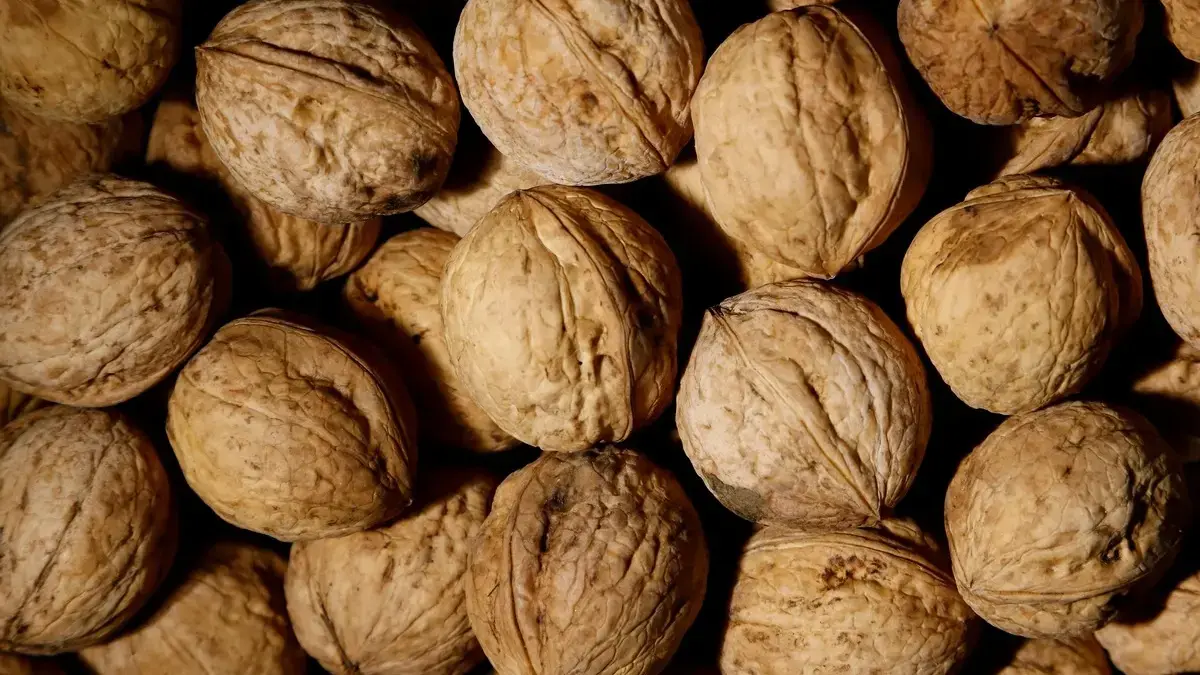The purpose of this article is to highlight the benefits of walnuts on health. Walnut is considered a perfect disease preventing food, but this doesn’t mean you should stop taking your prescribed medication. The aim is to increase awareness about choosing a healthy diet over an unhealthy one (rich in saturated fats or excessive carbohydrates), which promotes positive health outcomes when combined with exercise. Do not discontinue your prescribed medication and always consult your physician before adding walnuts to your daily diet. This article is not an alternative to medical advice from physicians.
ABOUT WALNUTS
Walnut is a unique tree nut rich in many micronutrients that possess numerous health-promoting properties. New evidence from various studies highlights how walnut consumption positively impacts human health. It has been found that there is a well-documented association between walnut micronutrients and improved health outcomes such as in type 2 diabetes mellitus, cancer (colorectal, breast, and prostate), body weight regulation, reproductive health, heart health, metabolic syndromes, brain health, cognition (including Alzheimer’s disease), inflammation reduction, and the increase of beneficial gut bacteria.
WHY WALNUT IS SUPERIOR COMPARED TO OTHER SHELL NUTS
Walnuts contain about twice as many vitamins and antioxidants compared to other shell nuts.
HOW MUCH WALNUT SHOULD BE TAKEN?
Half a cup or one small handful is recommended daily according to different research studies.
MICRONUTRIENTS OF WALNUTS
Walnuts are enriched with vitamins, minerals, and antioxidants. The following healthful micronutrients are present in walnuts:
ALPHA-LINOLEIC ACID
It is a plant-based essential omega-3 polyunsaturated fatty acid that contains more than one double bond. The human body cannot synthesize it; therefore, it must be obtained from the diet. It is the parent compound of EPA (eicosapentaenoic acid) and DHA (docosahexaenoic acid), which are other forms of omega-3 fatty acids. However, this conversion occurs at a very slow rate. Fish is rich in EPA and DHA. The role of DHA and EPA in cardiovascular disease prevention is well established, while the role of ALA (alpha-linolenic acid) in heart health is less explored. ALA exhibits heart-friendly activity by reducing cholesterol levels, improving vascular health, and exerting anti-inflammatory, anti-thrombotic, and anti-arrhythmic effects.
HEART HEALTH
Cardiovascular disease is the leading cause of death worldwide. It can be prevented by addressing risk factors such as an unhealthy diet (high in saturated fats), alcohol or tobacco use, physical inactivity, and obesity. Inflammation plays a major role in the development and progression of cardiovascular disease. An unhealthy diet, hyperlipidemia, infection, and smoking can cause inflammation, leading to CVD. Alpha-linolenic acid in walnuts has anti-inflammatory properties exhibited by its bioactive metabolites known as oxylipins. Oxylipins reduce inflammation, improve blood pressure, and enhance vascular health. Due to these anti-inflammatory properties, walnuts decrease platelet aggregation and reduce plaque formation in blood vessels.
ATHEROSCLEROSIS
Different studies have shown that walnut consumption improves cardiovascular disease outcomes associated with atherosclerosis by increasing arterial elasticity by up to 64% and by reducing cell adhesion to arteries, preventing vessel hardening.
VENTRICULAR FIBRILLATION
Studies in rats suggest that compared to EPA and DHA, alpha-linolenic acid plays an important role in preventing ventricular fibrillation (irregular heart rhythms in which the lower chambers of the heart contract in an uncoordinated manner, affecting blood ejection and overall circulation). This indicates that ALA has potential anti-arrhythmic effects.
LOWER CHOLESTEROL LEVELS
LDL is often referred to as “bad cholesterol.” Walnut intake not only lowers LDL levels but also improves the quality of LDL particles. Small, dense LDL particles are mainly responsible for atherosclerosis, which can lead to heart disease or stroke.
IMPROVED HDL LEVELS
HDL is “good cholesterol” that provides protection against heart disease. Increased HDL levels lower the risk of coronary artery disease. Walnuts improve HDL levels in the blood. Therefore, walnut consumption helps maintain normal blood cholesterol levels and improves overall heart health.
PHYTOSTEROLS
Phytosterols are non-nutritive molecules chemically similar to cholesterol. They exhibit cholesterol-lowering properties because they are more hydrophobic than cholesterol, allowing them to replace or expel cholesterol from intestinal micelles and reduce its absorption, leading to lower systemic LDL levels.
GAMMA-TOCOPHEROL (VITAMIN E)
Gamma-tocopherol is considered a cardioprotective form of vitamin E due to its potent ability to trap free radicals (antioxidant activity) and reduce inflammatory disorders. This property may also be beneficial in cancer prevention.
LOW SODIUM AND HIGH POTASSIUM DIET
Walnuts are considered a low-sodium, high-potassium food, which is beneficial for preventing hypertension, stroke, and reducing cardiovascular mortality.
COPPER AND MANGANESE
Copper plays an important role in maintaining collagen and elastin, which are vital structural components of the body. Copper deficiency increases the risk of osteoporosis, while manganese supports calcium absorption.
HIGH MAGNESIUM
High magnesium content in walnuts is associated with improved endothelial function and a reduction in cardiovascular risk factors.
POLYPHENOLS
Walnuts are rich in polyphenols, particularly ellagitannins and pedunculagin. Upon hydrolysis, ellagitannins release ellagic acid, which is later metabolized into urolithins. Both ellagitannins and urolithins have anti-inflammatory, antioxidant, anticancer, and prebiotic effects. According to a meta-analysis, consumption of ellagitannin-rich foods, particularly walnuts, can reduce adiposity, LDL cholesterol, and glucose levels.
CANCER
Many study findings consistently show that walnuts have anticancer properties.
BREAST CANCER
According to a recent human study, consuming 2 ounces of walnuts per day for about two weeks suppressed the progression of breast cancer by altering gene expression in tumors.
COLON CANCER
Some studies show that walnuts modify the microbial flora of the large intestine, which possesses tumor-suppressing potential and helps in preventing colon carcinogenesis.
REDUCTION OF OXIDATIVE STRESS
Oxidative stress leads to the formation of free radicals. If not eliminated, these radicals damage cells and cause inflammation, which is the root of many diseases such as heart disease, type 2 diabetes mellitus, Alzheimer’s disease, and cancer. Vitamin E, copper, manganese, and polyphenols in walnuts act as antioxidants that trap free radicals produced by pollution, UV radiation, smoke, stress, junk foods, and exposure to heavy metals.
BRAIN HEALTH
A walnut resembles the human brain and is often called “brain food.” Vitamin E, folate, melatonin, omega-3 fatty acids, and other antioxidants present in walnuts are considered neuroprotective. Oxylipins, metabolites of polyunsaturated fatty acids, play a key role in delaying brain aging. Reduction of oxidative stress and inflammation improves cognitive function. Incorporating walnuts into the diet may boost memory in children and older adults. Clinical trials conducted by the University of South Australia revealed that walnut consumption during stress improved mental health, sleep, and overall well-being.
WALNUT AND GUT HEALTH
Recent research indicates that walnut consumption improves gut health by increasing the amino acid L-homoarginine in the stomach. Deficiency of this amino acid is considered a risk factor for heart disease. Gut health is crucial for overall wellness and may also help prevent cardiovascular problems.
WILL WALNUT CONSUMPTION CAUSE WEIGHT GAIN?
Walnuts are calorie-dense but healthful foods rich in fiber, protein, micronutrients, minerals, and vitamins. It is often assumed that eating too many walnuts may lead to weight gain. Generally, 1 gram of carbohydrates or protein provides 4 calories, while 1 gram of fat provides 9 calories. Therefore, portion control is important. Overconsumption can cause diarrhea, so walnuts should be eaten in moderation. Despite being energy-dense, walnuts promote satiety and reduce appetite between meals. According to a study published in Diabetes, Obesity and Metabolism (2017), a small controlled trial found that walnuts decreased appetite and improved appetite regulation, possibly due to changes in brain activity related to hunger control.
JOURNAL OF NUTRITION
According to the Journal of Nutrition, both acute and chronic walnut consumption (42.5–85 g/day) is associated with cardioprotective effects and reduced cardiovascular risk factors by lowering total and LDL cholesterol, decreasing blood pressure, improving endothelial function, reducing oxidative stress and inflammation, and increasing cholesterol efflux.
CONCLUSION
Walnuts are a healthful food. Their synergistic combination of micronutrients contributes to overall positive health outcomes, especially for heart health. Although findings from different studies (animal, human observational, and epidemiological) reveal positive health effects, they should not be considered conclusive. Large-scale research is still required to fully explore the benefits of walnuts and establish definitive conclusions
FAQs
1. Can eating walnuts every day improve heart health?
Yes. Regular walnut consumption supports heart health by lowering LDL cholesterol, reducing inflammation, and improving vascular function.
2. How many walnuts should I eat daily?
Research suggests half a cup or a small handful (about 28–30 grams) daily provides optimal health benefits.
3. Do walnuts help in weight loss?
Yes, walnuts help reduce appetite and promote satiety, which may support weight management when eaten in moderation.
4. Are walnuts safe for people with diabetes?
Yes. Walnuts may help regulate blood sugar and improve insulin sensitivity due to their omega-3 and polyphenol content.
5. Can walnuts improve brain function?
Absolutely. Walnuts are rich in omega-3 fatty acids, antioxidants, and vitamin E, all of which support cognitive health and memory.
DISCLAIMER
This article is for educational purposes only and is not a substitute for professional medical advice. Always consult your healthcare provider or physician before making any dietary changes or starting new supplements.
CALL TO ACTION
Incorporate a handful of walnuts into your daily diet to naturally support your heart, brain, and metabolic health. Pair this with regular exercise and a balanced diet for the best long-term benefits.
Read more: https://pharmahealths.com/chicken-soup-natural-expectorant-immunity-booster/
REFERENCES
1. Ros, E. et al. Journal of Nutrition (2018). Effects of walnut consumption on cardiovascular risk factors.
2. Arab, L., & Ang, A. (2015). British Journal of Nutrition. “Walnut consumption and brain health.”
3. Tapsell, L. C., et al. (2017). Diabetes, Obesity and Metabolism. “Walnuts and appetite regulation: controlled trial results.”
4. University of South Australia Clinical Trial Report (2022). Walnut intake and cognitive wellbeing.
5. U.S. Department of Agriculture. Nutrient Database for Standard Reference, 2020.








Amazing